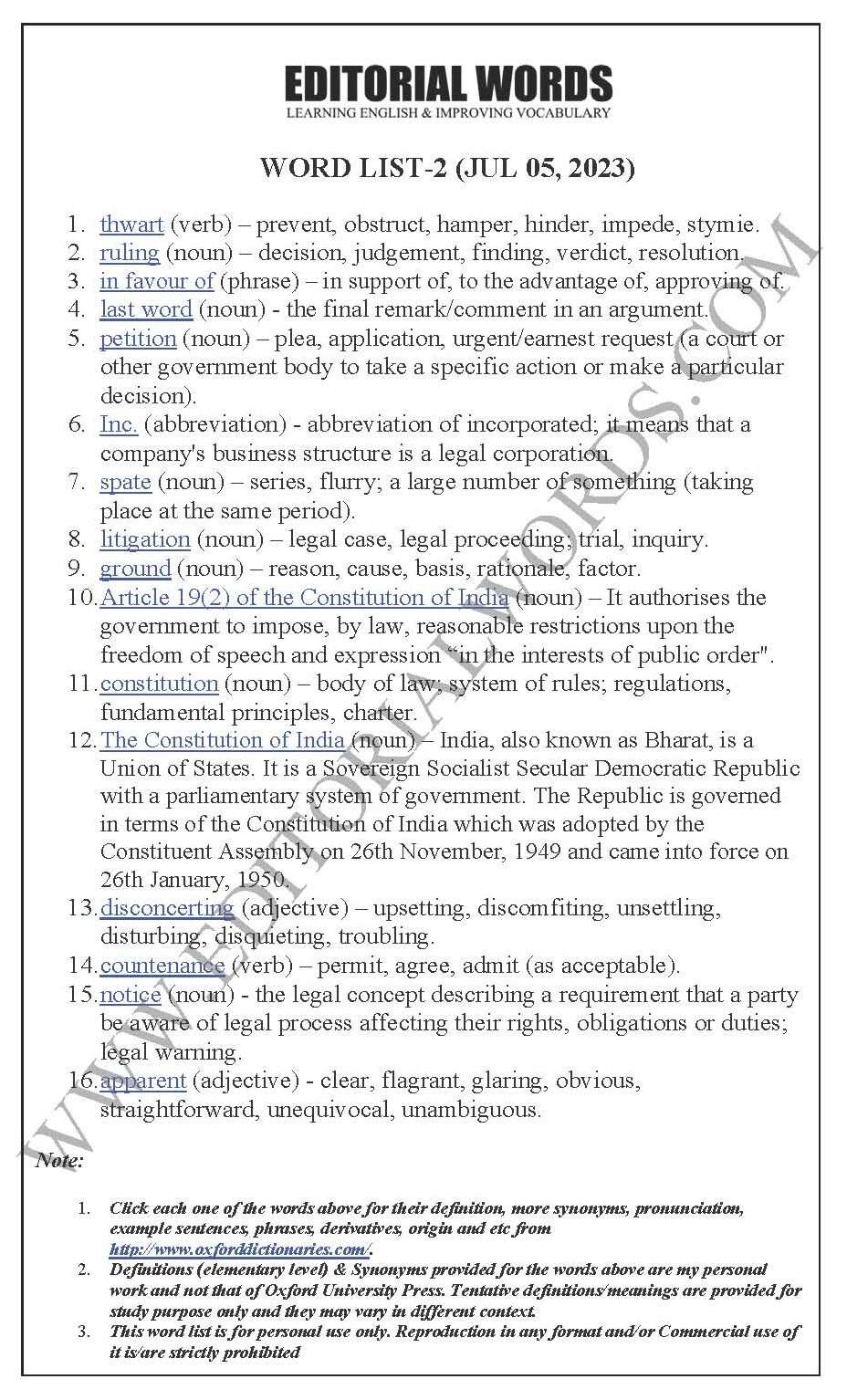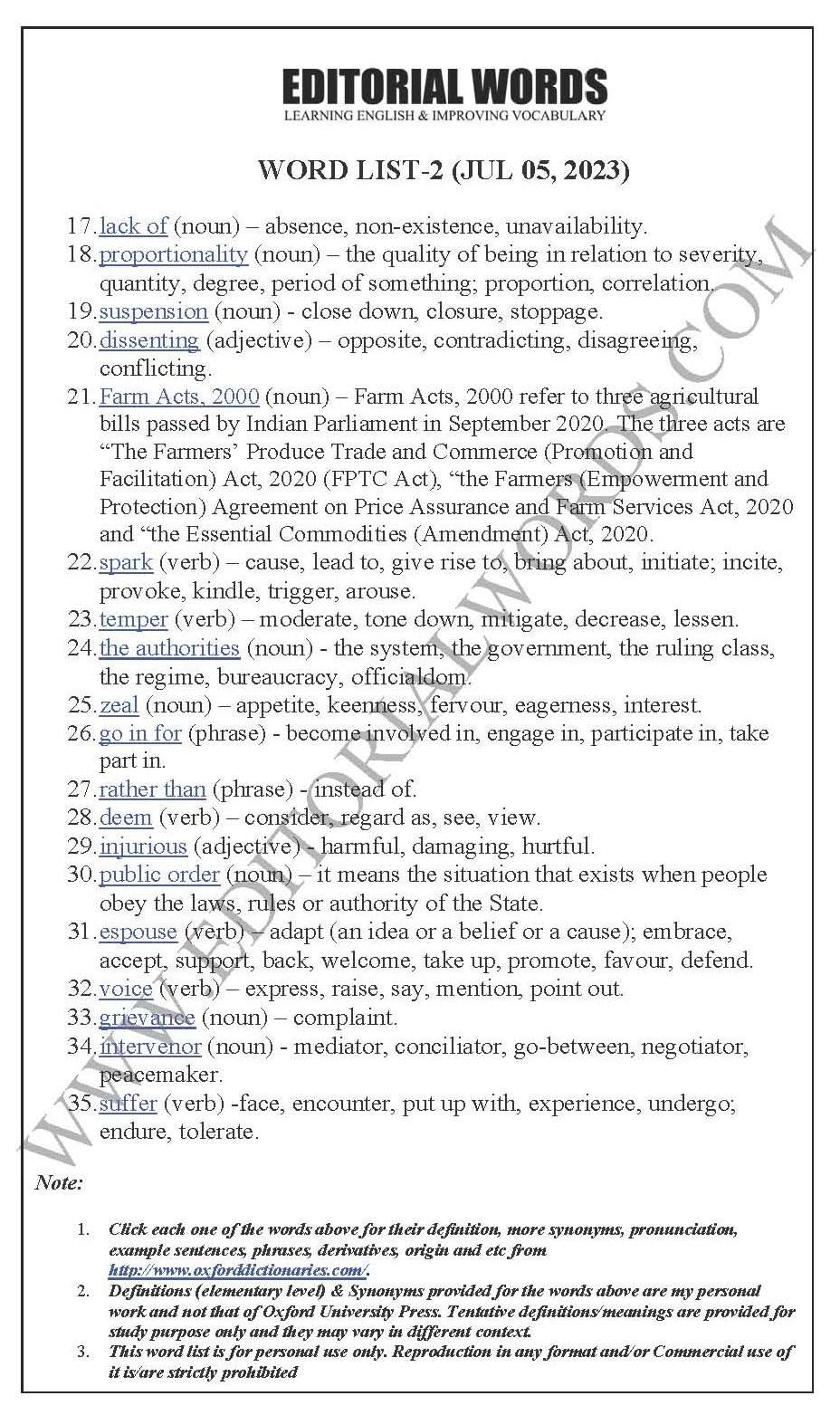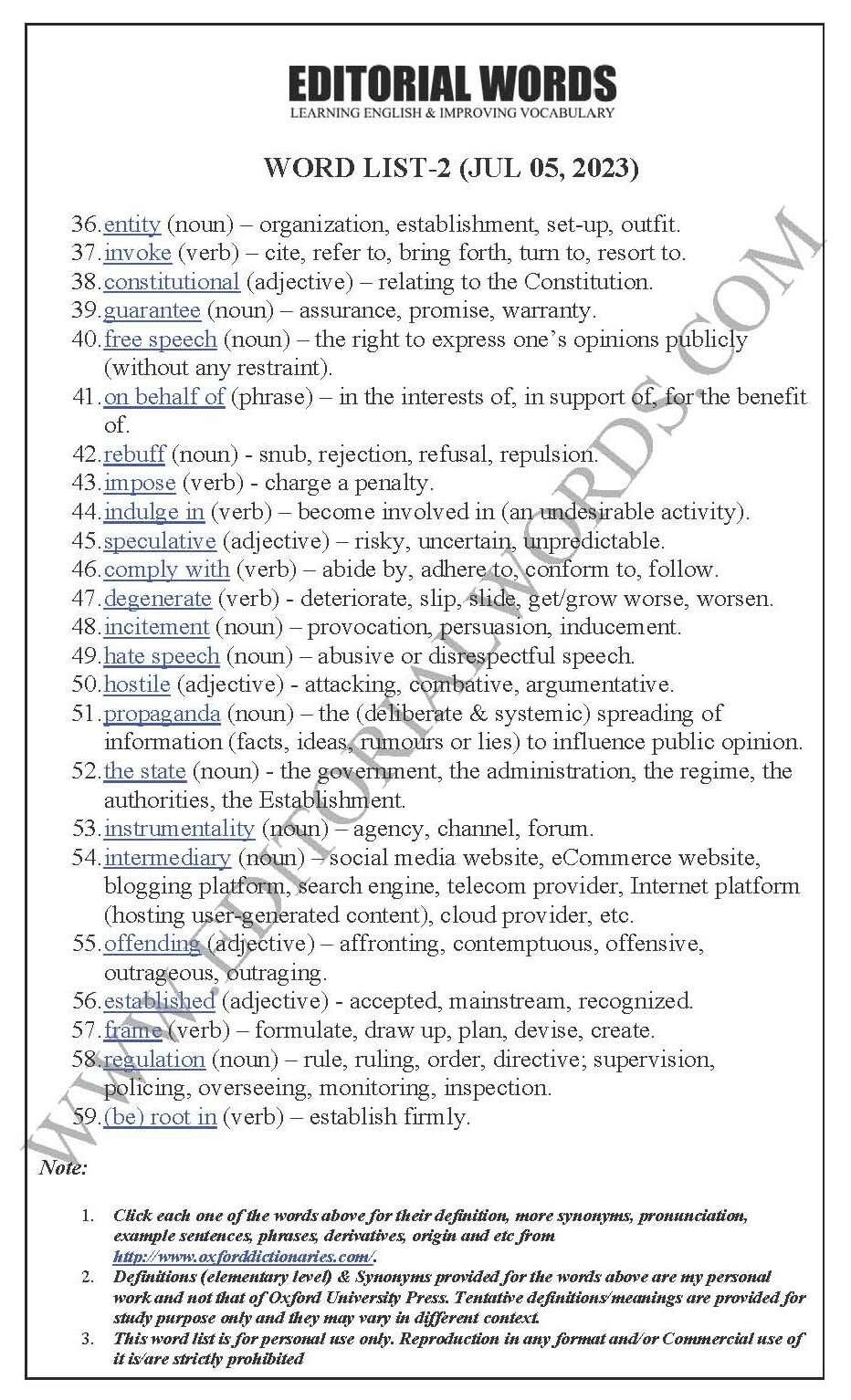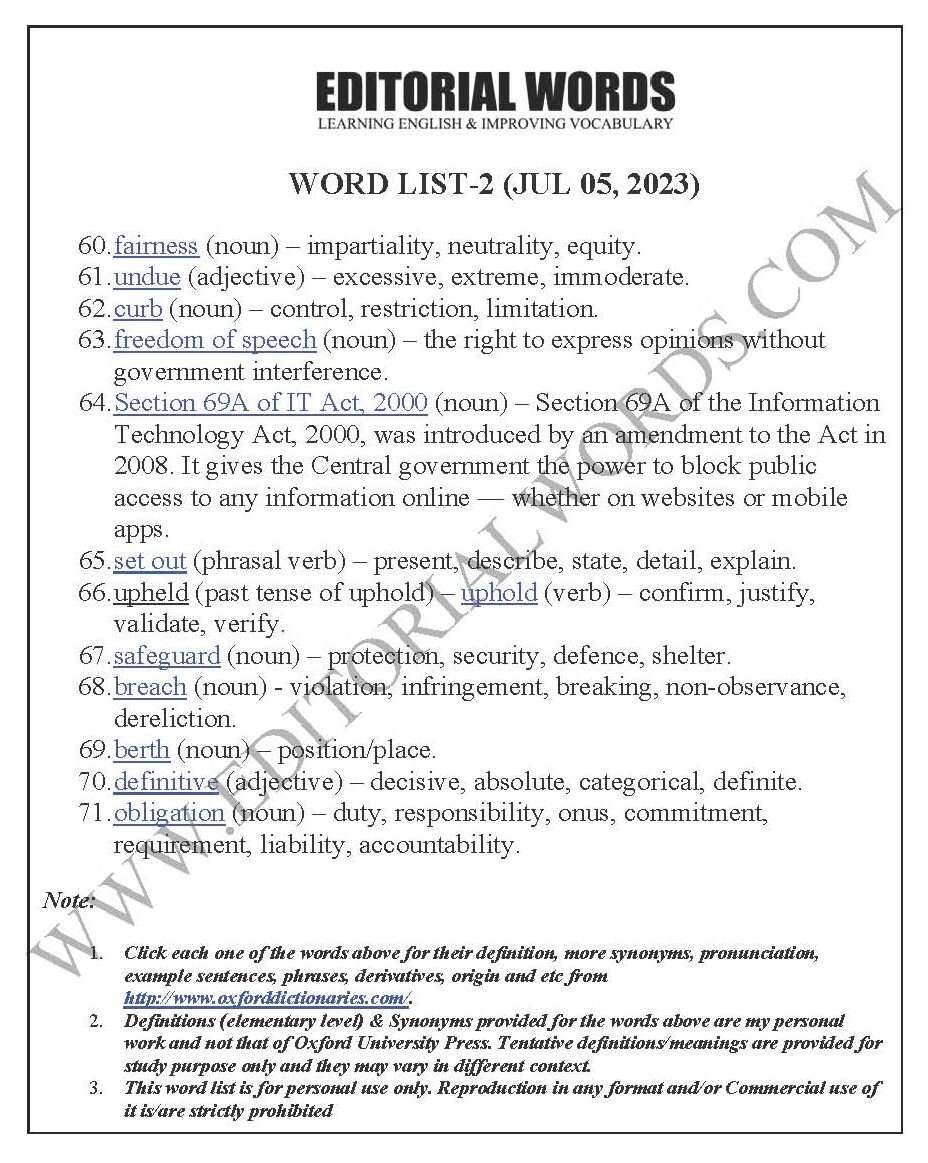The Hindu Editorial (Thwarting Twitter) – Jul 05, 2023
To read this article, click “The Hindu”.
This preview is provided here with permission.
Courtesy: The Hindu
The Hindu Editorial (Thwarting Twitter) – Jul 05, 2023:
- thwart (verb) – prevent, obstruct, hamper, hinder, impede, stymie.
- ruling (noun) – decision, judgement, finding, verdict, resolution.
- in favour of (phrase) – in support of, to the advantage of, approving of.
- last word (noun) – the final remark/comment in an argument.
- petition (noun) – plea, application, urgent/earnest request (a court or other government body to take a specific action or make a particular decision).
- Inc. (abbreviation) – abbreviation of incorporated; it means that a company’s business structure is a legal corporation.
- spate (noun) – series, flurry; a large number of something (taking place at the same period).
- litigation (noun) – legal case, legal proceeding; trial, inquiry.
- ground (noun) – reason, cause, basis, rationale, factor.
- Article 19(2) of the Constitution of India (noun) – It authorises the government to impose, by law, reasonable restrictions upon the freedom of speech and expression “in the interests of public order”.
- constitution (noun) – body of law; system of rules; regulations, fundamental principles, charter.
- The Constitution of India (noun) – India, also known as Bharat, is a Union of States. It is a Sovereign Socialist Secular Democratic Republic with a parliamentary system of government. The Republic is governed in terms of the Constitution of India which was adopted by the Constituent Assembly on 26th November, 1949 and came into force on 26th January, 1950.
- disconcerting (adjective) – upsetting, discomfiting, unsettling, disturbing, disquieting, troubling.
- countenance (verb) – permit, agree, admit (as acceptable).
- notice (noun) – the legal concept describing a requirement that a party be aware of legal process affecting their rights, obligations or duties; legal warning.
- apparent (adjective) – clear, flagrant, glaring, obvious, straightforward, unequivocal, unambiguous.
- lack of (noun) – absence, non-existence, unavailability.
- proportionality (noun) – the quality of being in relation to severity, quantity, degree, period of something; proportion, correlation.
- suspension (noun) – close down, closure, stoppage.
- dissenting (adjective) – opposite, contradicting, disagreeing, conflicting.
- Farm Acts, 2000 (noun) – Farm Acts, 2000 refer to three agricultural bills passed by Indian Parliament in September 2020. The three acts are “The Farmers’ Produce Trade and Commerce (Promotion and Facilitation) Act, 2020 (FPTC Act), “the Farmers (Empowerment and Protection) Agreement on Price Assurance and Farm Services Act, 2020 and “the Essential Commodities (Amendment) Act, 2020.
- spark (verb) – cause, lead to, give rise to, bring about, initiate; incite, provoke, kindle, trigger, arouse.
- temper (verb) – moderate, tone down, mitigate, decrease, lessen.
- the authorities (noun) – the system, the government, the ruling class, the regime, bureaucracy, officialdom.
- zeal (noun) – appetite, keenness, fervour, eagerness, interest.
- go in for (phrase) – become involved in, engage in, participate in, take part in.
- rather than (phrase) – instead of.
- deem (verb) – consider, regard as, see, view.
- injurious (adjective) – harmful, damaging, hurtful.
- public order (noun) – it means the situation that exists when people obey the laws, rules or authority of the State.
- espouse (verb) – adapt (an idea or a belief or a cause); embrace, accept, support, back, welcome, take up, promote, favour, defend.
- voice (verb) – express, raise, say, mention, point out.
- grievance (noun) – complaint.
- intervenor (noun) – mediator, conciliator, go-between, negotiator, peacemaker.
- suffer (verb) -face, encounter, put up with, experience, undergo; endure, tolerate.
- entity (noun) – organization, establishment, set-up, outfit.
- invoke (verb) – cite, refer to, bring forth, turn to, resort to.
- constitutional (adjective) – relating to the Constitution.
- guarantee (noun) – assurance, promise, warranty.
- free speech (noun) – the right to express one’s opinions publicly (without any restraint).
- on behalf of (phrase) – in the interests of, in support of, for the benefit of.
- rebuff (noun) – snub, rejection, refusal, repulsion.
- impose (verb) – charge a penalty.
- indulge in (verb) – become involved in (an undesirable activity).
- speculative (adjective) – risky, uncertain, unpredictable.
- comply with (verb) – abide by, adhere to, conform to, follow.
- degenerate (verb) – deteriorate, slip, slide, get/grow worse, worsen.
- incitement (noun) – provocation, persuasion, inducement.
- hate speech (noun) – abusive or disrespectful speech.
- hostile (adjective) – attacking, combative, argumentative.
- propaganda (noun) – the (deliberate & systemic) spreading of information (facts, ideas, rumours or lies) to influence public opinion.
- the state (noun) – the government, the administration, the regime, the authorities, the Establishment.
- instrumentality (noun) – agency, channel, forum.
- intermediary (noun) – social media website, eCommerce website, blogging platform, search engine, telecom provider, Internet platform (hosting user-generated content), cloud provider, etc.
- offending (adjective) – affronting, contemptuous, offensive, outrageous, outraging.
- established (adjective) – accepted, mainstream, recognized.
- frame (verb) – formulate, draw up, plan, devise, create.
- regulation (noun) – rule, ruling, order, directive; supervision, policing, overseeing, monitoring, inspection.
- (be) root in (verb) – establish firmly.
- fairness (noun) – impartiality, neutrality, equity.
- undue (adjective) – excessive, extreme, immoderate.
- curb (noun) – control, restriction, limitation.
- freedom of speech (noun) – the right to express opinions without government interference.
- Section 69A of IT Act, 2000 (noun) – Section 69A of the Information Technology Act, 2000, was introduced by an amendment to the Act in 2008. It gives the Central government the power to block public access to any information online — whether on websites or mobile apps.
- set out (phrasal verb) – present, describe, state, detail, explain.
- upheld (past tense of uphold) – uphold (verb) – confirm, justify, validate, verify.
- safeguard (noun) – protection, security, defence, shelter.
- breach (noun) – violation, infringement, breaking, non-observance, dereliction.
- berth (noun) – position/place.
- definitive (adjective) – decisive, absolute, categorical, definite.
- obligation (noun) – duty, responsibility, onus, commitment, requirement, liability, accountability.
Note:
1. Click each one of the words above for their definition, more synonyms, pronunciation, example sentences, phrases, derivatives, origin and etc from http://www.oxforddictionaries.com/.
2. Definitions (elementary level) & Synonyms provided for the words above are my personal work and not that of Oxford University Press. Tentative definitions/meanings are provided for study purpose only and they may vary in a different context.
3. This word list is for personal use only. Reproduction in any format and/or Commercial use of it is/are strictly prohibited.
The Hindu Editorial (Thwarting Twitter) – Jul 05, 2023:




“Phrasal Verbs” We Learnt Last Week
“Idioms & Phrases” We Learnt Last Week
“Important Definitions” We Learnt Last Week
Recent Word Lists For The Hindu Editorial Articles

It is unfortunate that the petition by Twitter, Inc. challenging the validity of the spate of blocking orders passed by the Union government was rejected by the Karnataka High Court. For further reading, visit “The Hindu”. Below is today’s word list-2 for The Hindu Editorial (Thwarting Twitter) – Jul 05, 2023.